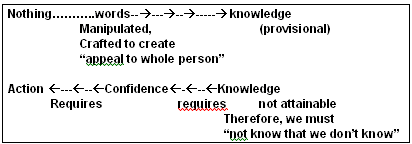Week 2--Gorgias
What does Gorgias emphasize? Why is this significant to both classical rhetoric and contemporary teaching? And finally, what are you thinking about for your 20-page paper/project thus far?Gorgias emphasizes that knowledge is "provisional" and that Truth does not exist or that knowledge of Truth is not attainable. In order for us to believe anything, we need to "be distracted from the limitations of provisional knowledge" (B/H). This reminds me of the idea of suspension of disbelief especially as it applies to popular movies. In order to truly enjoy the movie, I must believe that the actions performed in the film are possible.

Exchange of knowedge requires "shared deception effected by language"; all must be deceived in the same way (?). Is this possible?
In order to discuss the idea of a "flat" world, all participants need to believe (be deceived) that there is such a thing as "world" and that it is not "round"
The only available knowledge is opinion which is created and changed by language. The power of language is that it can persuade and in doing so can violate and also heal.
How are these ideas important?
The idea of the persuasive power of language is important in classical rhetoric because that allows others to concentrate on other areas of study such as techniques which are most effective, different types of persuasion possible, ethics of persuasion, etc.
It also offers some, like Plato, the ability (choice) to disagree with the general statement that knowledge can only be provisional and thus the power of lanaguage lies in its ability to persuade.
Also, the idea that language is inherently deceitful adds a moral component to language and makes the rhetor responsible for the outcome/effects of that language.
This argument of the capability of language and where responsibility lies can be found in the violence in media debate. Does if affect what consumers of that media do? After all, "we are what we eat."
How do these ideas fit into contemporary teaching?
The idea that language can "heal" or "violate" is not discussed much in higher education, but it is very relevant to how students learn. Research shows that students have an affective response to learning and when they feel "good" they learn more. Thus, how the educator uses language in communicating with and about the students, not only concerning content but also personal issues, is very important.
Gorgias' ideas about action requiring confidence which requires knowlege is very applicable to the writing classroom. I see beginning writing students falling into two main categories: those who are so convinced that they do not know that they are unwilling to act and those who are so convinced that they do know but still do not meet the standards of effective communication. Many students face the blank page and want to be certain (confident) that they can do something right and will not proceed (act) until they are sure they "know." They are, sometimes, very hesitant to write in order to discover what they know and what they don't know. They don't see writing as a process of discovery but only see it as a manifestation of their knowledge and proficiency. Conversely, other students are so confident that they "know" how to be effective that they are also not open to the process of discovery. The most successful students are those who accept that they don't know but are still willing to write (act) in order to learn more about how to be effective within the context in which they are working.


4 Comments:
Janie,
Thanks for your encouragement as I come back to school and stretch my brain.
Your comment about suspending disbelief (instead of belief) was interesting. I had been thinking of Gorgias's approach in terms of deconstruction--the play between signified and signifier, and the interpretation of meaning--but I like coming at it from the direction of suspending disbelief. That puts a new spin on it for me.
I think we are so bombarded with "knowledge" in this information age that we are desensitized to the power of language (and rhetoric) in all of its forms. Gorgias reminds us of the very influential nature of these words we use. As a teacher, what do you do to heighten your students' awareness of the power of language?
Alison
I like the idea of truth as the concept of "shared deception." I personally was thinking of it more as collectively constructed knowledge, but shared deception works too.
Kendall
So, Gorgias is saying that knowledge is contextual. Truth doesn't exists. This differs for Plato, obviously, who felt he could tap into the true sublime or knowledge. Of course, even for Plato, to tell us about that knowledge is to mitigrate the Truth to the truth. Need to have a "felt sense" of the Truth, which is what Sondra Perlman says in the 20th century with regard to voice and composition.
Deception isn't necessarily evil. It's a misrepresentation or approximation. Plato's cave analogy is a good one here.
You mention "flat" world (which brings up Friedman from one of the townhalls at C&W. What happens when we all make assumptions about language, and presume that indeed we're not being deceived? Does this impact the playing field, so to speak? Isn't that more practical in getting something across or acknowledging something?
I think many of these ideas come up with writing. For instance, the idea of commenting on a paper as usurping the ideas of the student and taking them over. Or, the rhetoric of disclosure which, done wrong, is a form of violation. Look up David Bleich.
No need for the apostrophe there in the first sentence.
How's your paper topic coming along now?
Post a Comment
<< Home